Related Research Articles

The archbishop of Canterbury is the senior bishop and a principal leader of the Church of England, the ceremonial head of the worldwide Anglican Communion and the bishop of the Diocese of Canterbury. The current archbishop is Justin Welby, who was enthroned at Canterbury Cathedral on 21 March 2013. Welby is the 105th person to hold the position, as part of a line of succession going back to the "Apostle to the English", Augustine of Canterbury, who was sent to the island by the church in Rome and arrived in 597. Welby succeeded Rowan Williams.

Charles Thomas Longley was a bishop in the Church of England. He served as Bishop of Ripon, Bishop of Durham, Archbishop of York and Archbishop of Canterbury from 1862 until his death.

The Lambeth Conference convenes as the Archbishop of Canterbury summons an assembly of Anglican bishops every ten years. The first took place at Lambeth in 1867.

Richard John Carew Chartres, Baron Chartres,, FBS is a retired senior bishop of the Church of England.
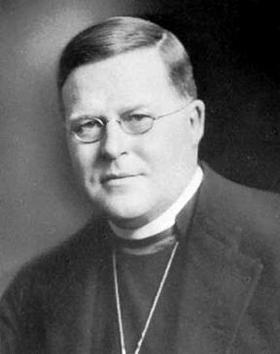
William Temple was an English Anglican priest, who served as Bishop of Manchester (1921–1929), Archbishop of York (1929–1942) and Archbishop of Canterbury (1942–1944).
David Michael Hope, Baron Hope of Thornes, is a retired Anglican bishop. He was the Bishop of Wakefield between 1985 and 1991 and the Bishop of London between 1991 and 1995. From 1995 to 2005, he was the Archbishop of York in the Church of England. In March 2005, he was made a life peer and therefore a member of the House of Lords; he had already sat in the house as a Lord Spiritual when he was a bishop. He retired from the Lords in April 2015.
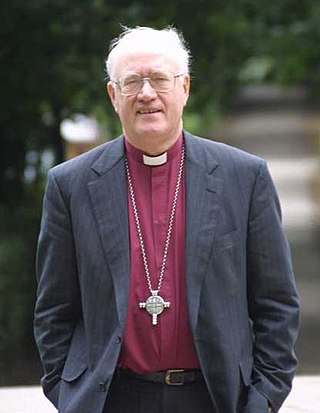
George Leonard Carey, Baron Carey of Clifton is a retired Anglican bishop who was the Archbishop of Canterbury from 1991 to 2002, having previously been the Bishop of Bath and Wells.

The Lords Spiritual are the bishops of the Church of England who sit in the House of Lords of the United Kingdom. Up to 26 of the 42 diocesan bishops and archbishops of the Church of England serve as Lords Spiritual. The Church of Scotland, which is Presbyterian, and the Anglican churches in Wales and in Northern Ireland, which are no longer established churches, are not represented. The Lords Spiritual are distinct from the Lords Temporal, their secular counterparts who also sit in the House of Lords.

Robert Alexander Kennedy Runcie, Baron Runcie, was an English Anglican bishop. He was the Archbishop of Canterbury from 1980 to 1991, having previously been Bishop of St Albans. He travelled the world widely to spread ecumenicism and worked to foster relations with both Protestant and Catholic churches across Europe. He was a leader of the Liberal Anglo-Catholicism movement. He came under attack for expressing compassion towards bereaved Argentines after the Falklands War of 1982, and generated controversy by supporting women's ordination.

Geoffrey Francis Fisher, Baron Fisher of Lambeth, was an English Anglican priest, and 99th Archbishop of Canterbury, serving from 1945 to 1961.
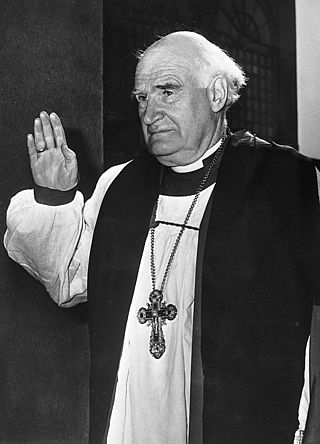
Arthur Michael Ramsey, Baron Ramsey of Canterbury, was a British Church of England bishop and life peer. He served as the 100th Archbishop of Canterbury. He was appointed on 31 May 1961 and held the office until 1974, having previously been appointed Bishop of Durham in 1952 and the Archbishop of York in 1956.
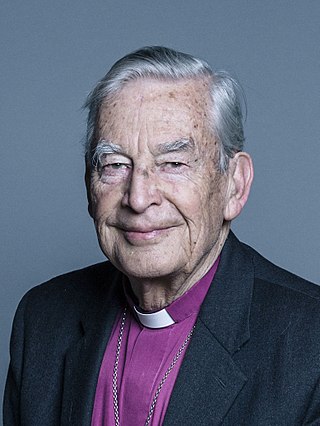
Richard Douglas Harries, Baron Harries of Pentregarth, FLSW is a retired bishop of the Church of England and former British Army officer. He was the Bishop of Oxford from 1987 to 2006. From 2008 until 2012 he was the Gresham Professor of Divinity.

Randall Thomas Davidson, 1st Baron Davidson of Lambeth, was an Anglican priest who was Archbishop of Canterbury from 1903 to 1928. He was the longest-serving holder of the office since the Reformation, and the first to retire from it.
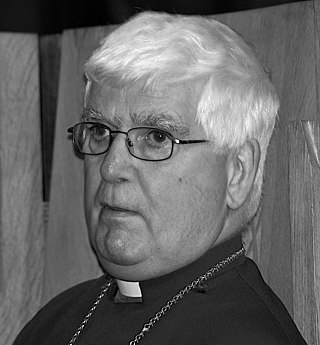
Thomas Frederick Butler is a British retired Anglican bishop. He was the ninth Anglican Bishop of Southwark. He was enthroned in Southwark Cathedral on 12 September 1998. He retired from this position on 5 March 2010. In 2014, Butler was involved in the transition process for the new Diocese of Leeds as "mentor bishop"; he remains an honorary assistant bishop of that diocese.

John Tucker Mugabi Sentamu, Baron Sentamu, is a retired Anglican bishop and life peer. He was Archbishop of York and Primate of England from 2005 to 2020.
Faith in the City: A Call for Action by Church and Nation was a report published in the United Kingdom in autumn 1985, authored by the Archbishop of Canterbury Robert Runcie's Commission on Urban Priority Areas. The report created a large amount of controversy when it was published, as one of its conclusions was that much of the blame for growing spiritual and economic poverty in British inner cities was due to government policies.

Westcott House is an Anglican theological college based on Jesus Lane in the centre of the university city of Cambridge in the United Kingdom. Its main activity is training people for ordained ministry in the Church of England and other Anglican churches. Westcott House is a founding member of the Cambridge Theological Federation. The college is considered by many to be Liberal Catholic in its tradition, but it accepts ordinands from a range of traditions in the Church of England.
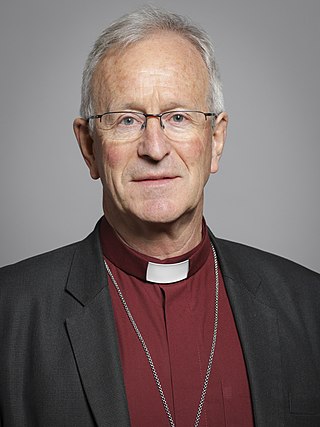
David Andrew Urquhart is a retired Scottish bishop. He served as the ninth Bishop of Birmingham in the Church of England.
John Bernard Taylor was a British bishop and theologian who served as Bishop of St Albans.
References
- ↑ Becket, Adam. "Death announced of John Habgood, former Archbishop of York". Church Times. Retrieved 7 March 2019.
- 1 2 Hall, John (2023). "Habgood, John Stapylton, Baron Habgood (1927–2019), archbishop of York". Oxford Dictionary of National Biography (online ed.). Oxford University Press. doi:10.1093/odnb/9780198614128.013.90000380877.(Subscription or UK public library membership required.)
- 1 2 3 "HABGOOD, Baron". Who's Who. A & C Black. Retrieved 24 July 2017.(Subscription or UK public library membership required)
- ↑ University News. The Times (London, England), Wednesday, 19 March 1952; p. 6; Issue 52264
- ↑ Habgood, John Stapylton (1952). Hyperalgesia: an electro-physiological approach (PhD thesis). University of Cambridge.
- ↑ "Lord (John Stapylton) Habgood" . Crockford's Clerical Directory (online ed.). Church House Publishing . Retrieved 7 March 2019.
- ↑ Church web site
- ↑ New bishop consecrated The Times (London, England), Wednesday, 2 May 1973; p. 20; Issue 58771
- ↑ "The Right Reverend Lord Habgood: Archbishop of York of the highest intellectual calibre and integrity, whose liberal views proved unfashionable in the 1980s" Daily Telegraph Obituaries p33 Issue no 50,947 dated Friday 8 March 2019
- ↑ Of Choristers – York, The Minster School Archived 25 November 2010 at the Wayback Machine
- ↑ Guardian obituary David Sheppard 7 March 2006.
- ↑ Court Circular. The Times (London, England), Thursday, 22 December 1983; p. 12; Issue 61719
- ↑ "Habgood to retire as Archbishop of York". The Independent. 30 September 1994.
- 1 2 3 Webster, Alan (7 March 2019). "Lord Habgood obituary". The Guardian. London. Retrieved 7 March 2019.
- ↑ Longley, Clifford (31 March 1990). "Habgood by a head". The Times. p. 10.
- ↑ Longley, Clifford (4 May 1990). "Habgood's mitre in the Canterbury ring". The Times. p. 1.
- ↑ "Four left in Runcie race". The Sunday Times. 6 May 1990.
- ↑ "Bishops to help select archbishop". The Times. 23 June 1990. p. 3.
- ↑ "A Sceptic for Canterbury", The Times, 10 July 1990, p. 15.
- ↑ "Carey appointment welcomed by Runcie". The Times. 26 July 1990. p. 2.
- ↑ "Former Archbishop of York dies aged 91". BBC News. 7 March 2019. Retrieved 7 March 2019.
- ↑ "No. 54156". The London Gazette . 13 September 1995. p. 12433.
- ↑ "Former Archbishop of York retires from House of Lords". The Press. 3 October 2011.
- ↑ "Reviews in Science and Religion (Num. 49, May 2007, page 17)" (PDF). Archived from the original (PDF) on 14 May 2008. Retrieved 18 September 2008.
- ↑ Faith and Science in an Unjust World, World Council of Churches, 1980, ISBN 2-8254-0629-5, pp. 119–122
- ↑ "The Gifford Lectures". abdn.ac.uk. University of Aberdeen.
- ↑ The Times Literary Supplement 23 July 2008, John Habgood
- ↑ page 68 of Margenau, H. (1992). Cosmos, Bios, Theos: Scientists Reflect on Science, God, and the Origins of the Universe, Life, and Homo sapiens. Open Court Publishing Company. co-edited with Roy Abraham Varghese. This book is mentioned in a 28 December 1992 Time magazine article: Galileo And Other Faithful Scientists Archived 25 October 2012 at the Wayback Machine
- ↑ British Library web site accessed 17:08 GMT Friday 13 July 2011
- ↑ Debrett's Peerage. 2000.
External links
- Biography – John Habgood, on the Gifford Lectures site. 2000–2001 lectures are online.
- John Habgood – God debates at Cambridge website
- Contributions in the House of Lords
- "The Untidiness of Integration: John Stapylton Habgood" Archived 25 March 2016 at the Wayback Machine . Kevin Seybold, Volume 57 Number 2. June 2005. PSCF
John Habgood | |
|---|---|
| Archbishop of York | |
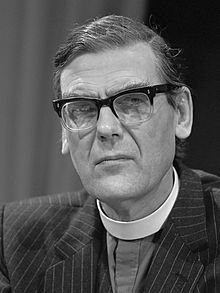 Habgood in 1981 | |
| Province | Province of York |
| Diocese | Diocese of York |
| Installed | 18 November 1983 |
| Term ended | 1995 |
| Predecessor | Stuart Blanch |
| Successor | David Hope |
| Other post(s) | Bishop of Durham (1973–1983) |
| Orders | |
| Ordination | 1954 |
| Consecration | 1973 |
| Personal details | |
| Born | John Stapylton Habgood 23 June 1927 Wolverton, England |
| Died | 6 March 2019 (aged 91) York, England |
| Denomination | Anglican |
| Member of the House of Lords Lord Temporal | |
| In office 8 September 1995 –3 October 2011 | |